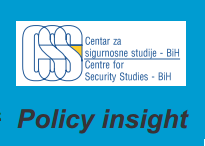
We kindly inform you that, as long as the subject affiliation of our 300.000+ articles is in progress, you might get unsufficient or no results on your third level or second level search. In this case, please broaden your search criteria.

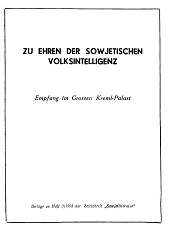
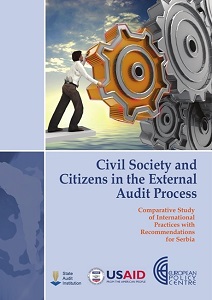
The aim of this Study is to provide the most appropriate solutions to the State Audit Institution of Serbia for the inclusion of citizens in the external audit process as well as to provide sustainable and more institutionalized forms of cooperation with civil society organizations. The Study adopts a comparative approach in its thorough analysis of European and non-European experiences and existing domestic institutional practices. A qualitative methodology was adopted in the form of a combination of primary and secondary sources, i.e. data collection was conducted through in-depth semi-structured interviews, electronic questionnaires, and the analysis of legislative and institutional frameworks and practices in regards to citizens’ cooperation in external audit process and cooperation of supreme audit institutions with the civil society. The methods applied proved as adequate in terms of analyzing comparative practices in the chosen systems and for getting a broader insight of the examples in the areas of transparency and government accountability, and more specifically in external audit, across a variety of states.
More...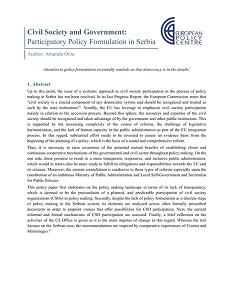
Up to this point, the issue of a systemic approach to civil society participation in the process of policy making in Serbia has not been resolved. In its last Progress Report, the European Commission notes that "civil society is a crucial component of any democratic system and should be recognized and treated as such by the state institutions". Notably, the EU has leverage to emphasize civil society participation mainly in relation to the accession process. Beyond this sphere, the resources and expertise of the civil society should be recognized and taken advantage of by the government and other public institutions. This is supported by the increasing complexity of the course of reforms, the challenge of legislative harmonization, and the lack of human capacity in the public administration as part of the EU integration process. In this regard, substantial effort needs to be invested to assure an evidence basis from the beginning of the planning of a policy, which is the basis of a sound and comprehensive reform. // This policy paper first elaborates on the policy making landscape in terms of its lack of transparency, which is deemed to be the precondition of a planned, and predictable participation of civil society organizations (CSOs) in policy making. Secondly, despite the lack of policy formulation as a discrete stage of policy making in the Serbian system, its elements are analyzed across other formally prescribed documents in order to pinpoint venues that offer possibilities for CSO participation. Next, the current informal and formal mechanisms of CSO participation are assessed. Finally, a brief reflection on the activities of the CS Office is given as it is the main impetus of change in this regard. Whereas the text focuses on the Serbian case, the recommendations are inspired by comparative experiences of Croatia and Montenegro.
More...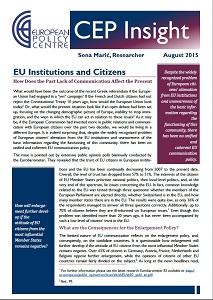
What would have been the outcome of the recent Greek referendum if the European Union had engaged in a "yes" campaign? If the French and Dutch citizens had not rejected the Constitutional Treaty 10 years ago, how would the European Union look today? Or, what would the present situation look like if an open debate had been set up, focusing on the changing demographic picture of Europe, inability to stop immi-gration, and the ways in which the EU can act in relation to these issues? As it may be, if the European Commission had invested more in public relations and communication with European citizens over the past two decades, we would be living in a different Europe. It is indeed surprising that, despite the widely recognized problem of European citizens’ alienation from the EU institutions and unawareness of the basic information regarding the functioning of this community, there has been no unified and coherent EU communication policy. This text is pointed out by extensive public opinion polls biannually conducted by the Eurobarometer. They revealed that the trust of EU citizens in European institutions and the EU has been continually decreasing from 2007 to the present date.
More...
One precious lesson learned by the European Union (EU) from the experience of its eastward expansion between 2004 and 2013, and applied now in the case of the Balkan aspiring members, has been to complement the politics of conditionality – that is, Brussel's traditional 'carrot and stick approach' – with the politics of pressure – whereby the region's governments are 'squeezed' in a "Brussels sandwich" between societal demands and an uncompromising European Commission. The Commission's search for civil society allies in the Balkans represents a promising break with the legacy of previous accessions, in which governments were Brussels' only trusted interlocutors. Yet, the new strategy still overestimates the ability of Balkan societies to step up to the mark by themselves. A vibrant civil society is a long-term investment that the EU should beef up further. The public administration reform (PAR) sector supplies concrete opportunities for the Union to do just that.
More...
The Government of Serbia falls short of ensuring transparency of its work. By regularly publishing cherry-picked information from its sessions, access to all adopted decisions becomes hardly possible and the approach to provision of information unjustiably selective. In addition, by irregularly reporting to the public on its performance, the Government reduces possibilities for public scrutiny of its results. Also, irregular reporting on budgetary performance adds to the overall picture of insufcient and low-quality reporting. Civil society in Serbia recognises these problems and holds the view that the Government’s decision making is for the most part hidden from the eyes of the public. If the Government wishes to adhere to the principles of good governance, it can only do so by thoroughly and regularly publishing detailed information about its activities and results, thus paving the way for free exercise of public scrutiny and facilitating the accountability for its actions.
More...
Modern forms of democratic governance are based on the public participation principle. Development objectives require good governance, which implies citizen participation in the governance process. Currently, we are witnessing a trend of disenchantment and alienation among politics and the public. Politicians are perceived as a group of elected officials, though distanced and separated from the public, to govern and solve public issues for a specific period of time. This is an increasingly troublesome tendency in Georgian society too, demonstrated in the latest massive survey, «Citizen Satisfaction with Public Services in Georgia», conducted by the Georgian research company ACT with the assistance from the United Nations Development Program (UNDP) in Georgia, Swiss Cooperation Office for the South Caucasus (SCO) and the Austrian Development Cooperation (ADC). The survey research shows the citizens’ attitudes towards the public services provided by the central and the local governments. Some tendencies revealed by the survey requires comprehensive analysis.
More...
Supporting the development of consistent, well-formulated, and thematically relevant election platforms is one of the major objectives in Georgia’s democratization effort. The Eastern European Center for Multiparty Democracy (EECMD) is playing a special role in this effort. Since the 2012 parliamentary election, their www.partiebi.ge website has been forwarding special questions on topics of public importance to political groups participating in the elections and making their responses easily accessible to voters. On this website, citizens can easily compare competitors’ political views and action plans on individual topics. This approach has another advantage – political leaders and their parties must respond to each question whether they discuss a specific topic in their platforms or not.
More...
Since independent Ukraine is a relatively young state on the map of Europe, and the processes of its state building took place fast and furious, it seems interesting to investigate what effect on the formation of democracy was made by the young generation in Ukraine. From such a point of view, the purpose of this study is to analyze the participation of young people in political life of independent Ukraine and the role of youth wings political parties in activating young voters. (BI-LINGUAL EDITION)
More...
This study may be useful for representatives of higher education institutions, government agencies, political parties and non-governmental organizations in terms of studying the best practices in developing political education programs based on comparing existing programs, identifying the strengths and weaknesses of each of them. The paper contains a comprehensive analysis of political education programs from different actors, as well as analysis of needs that are not met by existing programs. As a result, political parties that do not currently have their own youth education projects or party literacy activists will receive the necessary guidance and experience that will encourage them to intensify their work in this direction. When developing such programs, political parties should pay attention to international non-governmental organizations, funds that provide support, including financial, for the implementation of such initiatives.
More...
This publication provides a practical tool to help political parties conduct strategic planning and offers assistance providers and political parties alike a step-by-step methodology for conducting this planning process. If political parties want to prepare adequately for tomorrow’s political developments, they have to invest in their organization and its foundations. Doing so is only possible if the political party’s organizational structure and processes adequately reflect the rapidly changing political landscape that surrounds it. This means regularly analysing surroundings and adapting to new developments using broad input from within the party.
More...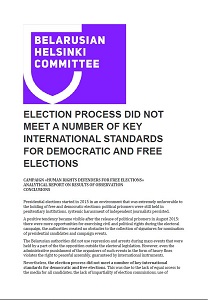
CAMPAIGN «HUMAN RIGHTS DEFENDERS FOR FREE ELECTIONS» ANALYTICAL REPORT ON RESULTS OF OBSERVATION CONCLUSIONS
More...
The analysis of the sector of civil society youth organizations, including the role and influence of their environment, is one of the sectoral analyses that the Office for European Expertise and Communications (OEEC) has been conducting since 2012. The aim of this analysis is to summarize the existing expert and scientific data regarding the development of specific sectors of the Belarusian civil society, and complement it with quantitative and qualitative studies of the aspects, which have not been studied so far.
More...
Despite the general adverse environment for civil society organizations in Belarus, human rights organizations and initiatives keep being rather active and their number continues to increase. There are newly created organizations and initiatives that do not always have sufficient experience and understanding of how to cooperate, but they are ready to become effective members of the human rights community. Earlier, there was already some work on the first joint project of a strategic concept for the Belarusan human rights community, which was accepted at the end of 2011. This work demonstrated that Belarusan human rights organisations did not often have any strategic planning and understanding of the way strategies should be implemented, though a need of a wider, holistic approach to activity was discerned accurately. In 2013, there was also big work aimed at defining joint strategic plans of cooperation for human rights defenders. At the end of 2015 and the beginning of 2016, human rights defenders acted with their joint strategic statements on the situation in the country and the necessary general actions.
More...
The instrument "Non-State Actors and Local Authorities" (NSA-LA) appeared in 2007, replacing the previous budget lines on this topic ("NGO co-financing" and "decentralized cooperation"). The NSA-LA instrument works in addition to the geographical programs and does not depend on the political relations between the EU and the government of the partner country. In cases of limited cooperation (complicated partnership situations, which include Belarus), this allows the European Commission (EC) to maintain its presence in the country, provide direct support to the population, help expand the population's access to basic services, and promote the development of democratic processes3. Being an instrument of development policy, the NSA-LA instrument is aimed at the comprehensive goals enshrined in the "European Consensus on Development"4: the eradication of poverty in the context of sustainable development, the achievement of the Millennium Development Goals5, the development of good governance and human rights.
More...
Local democracy is the level of relations between people and communities and state institutions closest to citizens. The local level is considered optimal for citizens' participation in politics, for the implementation of inclusive decision-making or participatory policy-making (inclusive decision-making, participatory policy-making). This is explained by the fact that, on the one hand, local issues are the most relevant for citizens, on the other hand, it is easiest to ensure participation at the local level (implement forms of communication between local authorities and civil society, and also apply mechanisms of direct democracy).
More...
"Barometer..." represents the results of public opinion polls conducted according to a common methodology in all countries of the Southern (except Syria) and Eastern neighborhood, plus - in Russia. Many questions are identical to the "EU Barometer", which makes it possible to compare data across the EU and the European Neighborhood region. The polls are carried out by local organizations-partners of the project, which make up a sample and conduct interviews based on questionnaires translated into the national languages of the participating countries.
More...
Monitoring of foreign aid for the purpose of development for Belarus is necessary to ensure greater transparency of this process, as well as to expand the possibilities of public control over the distribution of donor aid. In recent years, many Belarusian experts, state officials and politicians have been speculating quite often on the topic of donor aid provided to Belarus. State bodies and senior officials try to present the situation in such a way that all foreign aid from foreign states and international structures is directed exclusively to the support of civil society and the democratization of the country (or, in their terminology, to the support of the "fifth column" and the "overthrow of the political regime "). Among the political opposition, there are mutual accusations of improper spending of foreign aid funds and calls for monitoring of allocated funds. Representatives of the "third sector" pay attention to the low transparency of large cooperation projects with the state and, in general, to the low involvement of civil society in the implementation of donor aid programs for Belarus. A politically active part of Internet users in social networks and forums criticizes public and political forces for senseless "eating" of grants. As a rule, all these speculations are not based on real facts and, at best, reflect personal experience of contact with any aspects of the implementation of grant projects or the activities of public and political organizations. In order to make reasonable judgments, it is necessary to rely on specific facts and real data, and it is precisely to present such information that this study was carried out.
More...
In this document, we present a general picture of foreign aid for Belarus for the period 2006-2014 with an emphasis on issues of financing civil society activities, as well as the place of the EU and its member states in the general aid system. This work continues the studies of the Center for European Transformation, carried out in 2013 and 2014, and inherits their general logic1. The analysis of the total amount of aid, main donors, distribution channels, aid shares by individual sectors is supplemented with data for 2014, as well as a number of new summaries regarding the structure of aid to individual countries, the share of Belarus in the structure of aid to the countries of the Eastern Partnership, the analysis of specific projects to support Belarusian civil society with EU countries. In 2014, it finally became possible to analyze aid from the EU, taking into account all major donors (Poland and partially Sweden were not considered earlier, due to incomplete data in open sources).
More...